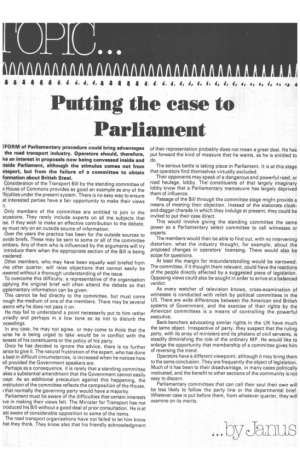Putting the case to Parliament
Page 75

If you've noticed an error in this article please click here to report it so we can fix it.
EFORM of Parliamentary procedure could bring advantages the road transport industry. Operators should, therefore, ke an interest in proposals now being canvassed inside and itside Parliament, although the stimulus comes not from insport, but from the failure of a committee to obtain Formation about British Steel. Consideration of the Transport Bill by the standing committee of e House of Commons provides as good an example as any of the 'ficulties under the present system. There is no easy way to ensure at interested parties have a fair opportunity to make their views t.
Only members of the committee are entitled to join in the icussions. They rarely include experts on all the subjects that ise. If they wish to make an effective contribution to the debate, ey must rely on an outside source of information.
Over the years the practice has been for the outside sources to ovide briefs. These may be sent to some or all of the committee embers. Any of them who is influenced by the arguments will try introduce them when the appropriate section of the Bill is being ,nsidered. Other members, who may have been equally well briefed from ,me other quarter, will raise objections that cannot easily be iswered without a thorough understanding of the issue. To overcome this difficulty, a representative of the organisation ipplying the original brief will often attend the debate so that ipplementary information can be given. This cannot be fed directly to the committee, but must come rough the medium of one of the members. There may be several asons why he does not pass it on. He may fail to understand a point necessarily put to him rather Jrriedly and perhaps in a low tone so as not to disturb the .oceedings. In any case, he may not agree, or may come to think that the iurse he is being urged to take would be in conflict with the terests of his constituents or the policy of his party. Once he has decided to ignore the advice, there is no further lance to give it. The natural frustration of the expert, who has done s best in difficult circumstances, is increased when he notices how ell provided the Government speakers are. Perhaps as a consequence, it is rarely that a standing committee akes a substantial amendment that the Government cannot easily :cept. As an additional precaution against this happening, the institution of the committee reflects the composition of the House, that normally the governing party would have a majority. Parliament must be aware of the difficulties that certain interests )ve in making their views felt. The Minister for Transport has not troduced his Bill without a good deal of prior consultation. He is at ast aware of considerable opposition to some of the items. The road transport organisations have not failed to let him know hat they think. They know also that his friendly acknowledgment of their representation probably does not mean a great deal. He has put forward the kind of measure that he wants, as he is entitled to do. The serious battle is taking place in Parliament, It is at this stage that operators find themselves virtually excluded. Their opponents may speak of a dangerous and powerful road, or road haulage, lobby. The constituents of that largely imaginary lobby know that a Parliamentary manoeuvre has largely deprived them of influence. Passage of the Bill through the committee stage might provide a means of meeting their objection. Instead of the elaborate cloakand-dagger charade in which they indulge at present, they could be invited to put their case direct. This would involve giving the standing committee the same power as a Parliamentary select committee to call witnesses or experts. The members would then be able to find out, with no intervening distortion, what the industry thought, for example, about the proposed changes in operators' licensing. There would also be scope for questions. At least the margin for misunderstanding would be narrowed. The committee, if it thought them relevant, could have the reactions of the people directly affected by a suggested piece of legislation. Opposing views could also be sought in order to arrive at a balanced verdict. As every watcher of television knows, cross-examination of witnesses is conducted with relish by political committees in the US. There are wide differences between the American and British systems of Government, and the exercise of their rights by the American committees is a means of controlling the powerful executive. Back-benchers advocating similar rights in the UK have much the same object. Irrespective of party, they suspect that the ruling party, with its array of ministers and its phalanx of civil servants, is steadily diminishing the role of the ordinary MP. He would like to enlarge the opportunity that membership of a committee gives him of reversing the trend. Operators have a different viewpoint, although it may bring them to the same conclusion. They are frequently the object of legislation. Much of it has been to their disadvantage, in many cases politically motivated, and the benefit to other sections of the community is not easy to discern. Parliamentary committees that can call their soul their own will be less likely to follow the party line or the departmental brief. Whatever case is put before them, from whatever quarter, they will examine on its merits.
...by Cia
























































































































